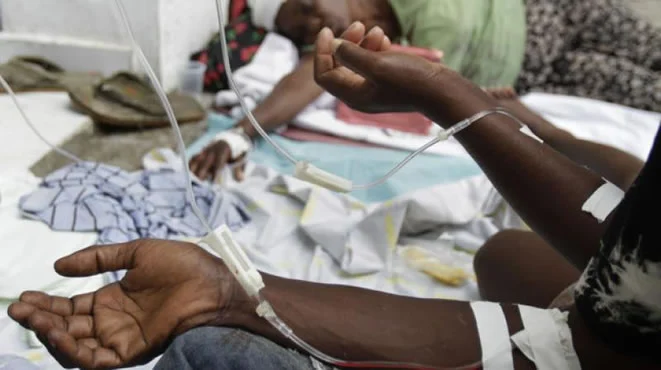National Issues
From Crisis To Liberty: How The Cholera Outbreak At Kirikiri Prison Can Lead To Prison Decongestion -By Chidera Chukwuemeka Nwokeke
How we treat the vulnerable among us shows the true measure of our society. The cholera outbreak at Kirikiri Prison should serve as a wake-up call for Nigeria’s criminal justice system. It is a meaningful opportunity to implement lasting reforms that prioritize the health and well-being of inmates.

Introduction
The recent cholera outbreak at Kirikiri Prison in Lagos, as reported by Vanguard Newspaper on July 1, 2024,[1] has brought to light a long-standing unattended issue in Nigeria’s correctional system. The World Health Organization (WHO) stepping in to address the situation underscores the severity of the outbreak and emphasizes the urgent need for systemic reform. This alarming public health situation coupled with the increasing prison population of 82,651 – (68% awaiting inmates and 32% convicted inmates)[2]shows the need for urgent reforms in the criminal justice system and the critical need for immediate action to decongest Nigerian prisons.
This article argues that the President and Governors of states particularly Lagos State, in the exercise of their constitutional powers, can grant pardons to deserving inmates, particularly the aged, those with health issues, and those convicted of petty offences. Additionally, the Chief Justice of Nigeria and Chief Judges of States can invoke their authority under the Criminal Justice (Release from Custody) Special Provisions Act[3] to release awaiting trial inmates who have languished in custody for years, those with health issues, and those accused of petty offences. Moreover, the Administration of Criminal Justice Act (ACJA)[4] also provides a framework for the courts to suspend sentences and mandate community services for minor offences. Through a review of legal frameworks, this article will demonstrate that the effective exercise of the above legal powers will lead to prison decongestion amidst the cholera outbreak at Kirikiri prison and drive long-term reforms.
THE CHOLERA OUTBREAK: A WAKE-UP CALL
Cholera, a preventable and treatable disease, thrives in conditions of poor sanitation and overcrowding—both hallmarks of Nigerian prisons. Kirikiri Prison, like many other correctional facilities in Nigeria, is notorious for its overcrowded and unsanitary conditions. The cholera outbreak is a direct consequence of these conditions, putting the lives of inmates and prison staff at significant risk. With limited access to clean water and adequate healthcare, diseases can spread rapidly, leading to a humanitarian crisis. However, beyond the immediate health crisis, this situation presents an opportunity to address the underlying issues plaguing the prison system.
Needless to say, in the face of this health crisis, balancing the right to health and life with the demands of criminal justice requires innovative and compassionate policy measures. This does not mean compromising on justice. Instead, it calls for a more humane and just approach to the criminal justice system. The right to health as enshrined in Article 16 of the African Charter on Human and Peoples’ Rights (Ratification and Enforcement) Act[5], which Nigeria has ratified imposes an obligation on the government to take the necessary measures to protect the health of their people even those in custody, and to ensure that they receive medical attention. This outbreak is a stark reminder that the health and well-being of inmates cannot be ignored or relegated to the back burner.
The Nigerian Constitution also guarantees the right to health and life for all citizens, including those incarcerated. Section 17(3)(d) of the Nigerian Constitution[6] mandates the state to ensure adequate medical and health facilities for all persons. In the context of prisons, this obligation becomes even more pronounced given the vulnerability of inmates. The cholera outbreak at Kirikiri Prison severely illustrates the failure to uphold these constitutional rights.
PRESIDENT AND GOVERNOR’S PREROGATIVE OF MERCY: A STRATEGIC RESPONSE
One effective way to alleviate the overcrowding in Nigerian prisons is through the strategic use of presidential and governor’s pardons. The Nigerian Constitution grants the President and state governors the power to pardon or commute sentences. This power, if exercised judiciously, can help decongest prisons, particularly in situations where convicted inmates are convicted for petty offences or are aged or have health challenges.
Countries such as the United States and India have successfully used pardons and early releases to manage prison populations during health crises. For instance, during the COVID-19 pandemic, several states in the U.S. released non-violent offenders and those with underlying health conditions to mitigate the spread of the virus within prisons.[7]
Sections 175 and 212 of the 1999 Constitution of Nigeria provide the President and Governors with the power of prerogative of mercy. These sections lay out the framework for pardons, respites, substitution of punishments, and remission of penalties. Specifically:
Section 175(1)[8]:
The President may grant pardons, either unconditionally or with conditions, to individuals convicted of offences created by an Act of the National Assembly.
- The President can grant respites for the execution of punishments.
- The President can substitute less severe forms of punishment.
- The President can remit whole or part of any punishment or penalty.
Section 212(1)[9]:
The Governor may grant pardons, either unconditionally or with conditions, to individuals convicted of state offences.
- The Governor can grant respites for the execution of punishments.
- The Governor can substitute less severe forms of punishment.
- The Governor can remit whole or part of any punishment or penalty.
These powers, when exercised thoughtfully and strategically, can significantly reduce the prison population and alleviate the dire conditions that contribute to outbreaks like the current cholera crisis.
The power of pardon, while vast, is not without its checks and balances. The Constitution mandates that the President[10]and Governor[11]must act on the advice of the Council of State. These safeguards ensure that the exercise of this power is balanced, considered, and just. Furthermore, this power is only exercisable after the person to be pardoned has been convicted and/or has exhausted his right of appeal against his conviction.[12]
The Court of Appeal in the case of FRN v. Dingyadi[13]held Per Uzo Ifeyinwa Ndukwe-Anyanwu, JCA (Pp 16 – 27 Paras A – E):
“…This pardon Exhibit Pardon 1 falls under the head of Prerogative of Mercy. This indeed cannot be set in motion unless there is a trial in a Court of law and there is a sentence convicting the accused persons which the Prerogative of Mercy will act as a panacea by mitigating or waiving the punishment. Where there has not been a trial and therefore no conviction, the Prerogative of Mercy cannot be invoked. The only remedy open to an accused standing trial is a withdrawal of the charge against him by the state Attorney-General….”
This article is a clarion call to the President and the Governor of Lagos State to exercise their constitutional power in the interest of the public health crisis. This power should be exercised more robustly to address the current crisis by focusing on three vulnerable groups of convicted inmates:
Aged Inmates: Many elderly prisoners pose no threat to society. Their continued incarceration often serves little purpose, considering their diminished capacity and the additional burden they place on the prison healthcare system. Pardoning aged inmates would not only alleviate overcrowding but also reflect a humane approach to justice.
Inmates with Health Issues: The cholera outbreak highlights the urgent need to protect inmates with compromised health conditions. These individuals are at heightened risk of severe illness and death in overcrowded and unsanitary conditions. Compassionate release for inmates with serious health issues is both a moral and practical necessity.
Convicted of Petty Offences: Many prisoners are serving time for minor, non-violent offenses. The continued incarceration of these individuals does not significantly contribute to public safety and diverts resources from more serious criminal cases. Pardoning these inmates would free up space and resources, allowing the justice system to focus on more pressing matters.
This article proposes that the President and Governor can significantly reduce prison overcrowding by strategically exercising the constitutional power of the prerogative of mercy. The constitutional provisions for pardon are designed to promote justice and mercy. The current situation at Kirikiri Prison presents a compelling case for their application. Granting pardons or reducing sentences for non-violent offenders, those with minor infractions, or those nearing the end of their sentences to non-custodial sentences can swiftly reduce the prison population. Furthermore, this approach aligns with international human rights standards, which advocate for the humane treatment of prisoners.[14] It is a step towards fulfilling Nigeria’s commitment to uphold the dignity and rights of all individuals, including those incarcerated. Additionally, reintegrating reformed individuals back into society can contribute to economic productivity and social stability.
EXERCISE OF THE POWERS TO RELEASE FROM PRISON BY THE CHIEF JUSTICE OF NIGERIA AND CHIEF JUDGES OF STATES
Beyond the executive arm, the judiciary also has significant powers to manage prison populations effectively. The Chief Justice of Nigeria and the Chief Judges of States hold significant authority under Section 1 of the Criminal Justice (Release from Custody) Special Provisions Act. This Act empowers them to order the release of any person if their detention is manifestly unlawful or if they have been detained for a period longer than the maximum imprisonment for the alleged offense. The section explicitly states:
Where, in respect of any person detained in any prison in Nigeria, not being a person detained in execution of a sentence of a court or tribunal duly constituted by law, the Chief Justice of Nigeria or the Chief Judge of a State is satisfied that:
(a) the detention of that person is manifestly unlawful; or
(b) the person detained has been in custody, whether on remand or otherwise, for a period longer than the maximum period of imprisonment which the person detained could have served had they been convicted of the offense in respect of which they were detained, the Chief Justice or the Chief Judge may issue an order of release to the officer in charge of the prison, and such officer shall, upon receipt of the order, release the person named therein.
The implications of Section 1(1) of the CJRCSP Act are profound. The Chief Justice of Nigeria and Chief Judges of States can exercise their power of release over individuals not serving court sentences, allowing them to attend their trials from outside prison custody. The legal effects of this power include:
Preservation of the Right to Liberty and presumption of innocence: This ensures that individuals are not unjustly deprived of their freedom and presumed guilty and condemned as a result of long detention in the prison facility.
Continuation of Court Proceedings: The release does not halt any ongoing court trial.
Possibility of Re-arrest: The release is merely a discharge from illegal detention, not an exemption from future lawful arrests.
It is apposite to highlight that the CJRCSP Act ensures that the implementation of these releases does not conflict with the provisions of Sections 175 and 212 of the 1999 Constitution of Nigeria, which grant exclusive powers to the President and Governors to grant pardon. By using the term “release,” the Act provides a mechanism to address unlawful detentions without encroaching on the powers to grant pardon.
Despite these clear provisions of the CJRCSP Act, thousands of inmates languish in Nigerian prisons without trial or conviction, many for periods exceeding the maximum sentence for their alleged offenses. This overcrowding has dire consequences, including the rapid spread of diseases like cholera. The ongoing health crisis at Kirikiri Prison is a poignant reminder of the human cost of this systemic issue.
In light of the above, this cholera outbreak should be a catalyst for immediate and decisive action. A judicious exercise of this power is imperative. It would ensure that individuals who have been in prolonged and unjustified prison custody are released, significantly decongesting prisons. This, in turn, would help curb the spread of diseases such as cholera, which thrives in overcrowded and unsanitary conditions.
SECTION 460 OF ACJA: A PATHWAY TO DECONGESTION
Section 460 of the Administration of Criminal Justice Act (ACJA) also provides a clear framework for alleviating overcrowded prisons by allowing courts to suspend sentences and mandate community service. The judiciary must leverage this legal provision to bring about meaningful change in this health crisis in the prison facility.
Section 460 (1) of the ACJA states:
Notwithstanding the provision of any other law creating an offence, where the court sees reason, the court may order that the sentence it imposed on the convict be, with or without conditions, suspended, in which case, the convict shall not be required to serve the sentence in accordance with the conditions of the suspension.
This clause empowers the court to exercise discretion and compassion, offering convicts an opportunity to serve their sentences outside the confines of overcrowded and unsanitary prison facilities. This cholera outbreak at the Kirikiri correctional facility is one of those decisive reasons that the court ought to exercise this discretion.
Moreover, Section 460 (2) ACJA expands on this by allowing courts to sentence convicts to perform specified services in their communities. This approach not only benefits the community but also aids in the rehabilitation of offenders, fostering a sense of responsibility and societal contribution.
It is crucial to note that Section 460 (3) ACJA ensures public safety by excluding serious offenders—those who have committed crimes involving the use of arms, offensive weapons, sexual offences, or offences punishable by imprisonment for more than three years—from these alternative sentencing measures. This balanced approach ensures that only those convicted of less severe crimes are eligible, thereby maintaining the integrity of the justice system while addressing the problem of prison overcrowding.
The court, in exercising its power under Section 460 (1) or (2) ACJA, must consider the need to:
Reduce congestion in prisons:[15] Overcrowded prisons are breeding grounds for diseases like cholera. By suspending sentences or imposing community service for non-violent offenders, the courts can significantly reduce the number of inmates, alleviating the strain on prison facilities and reducing the risk of disease outbreaks.
Rehabilitate prisoners by making them undertake productive work:[16] Community service provides an opportunity for convicts to engage in productive work, fostering a sense of responsibility and integration into society. This rehabilitative approach can reduce recidivism and promote social harmony.
Prevent convicts who commit simple offences from mixing with hardened criminals:[17] Mixing minor offenders with hardened criminals can lead to the former becoming more deeply entrenched in criminal behavior. By keeping these groups separate through alternative sentencing, the courts can prevent minor offenders from being negatively influenced and instead guide them toward reform.
By actively applying Section 460 of the ACJA, courts can play a pivotal role in transforming our correctional system. This approach not only addresses the immediate health crisis but also promotes a more humane and effective justice system, leading from crisis to liberty.
Conclusion
How we treat the vulnerable among us shows the true measure of our society. The cholera outbreak at Kirikiri Prison should serve as a wake-up call for Nigeria’s criminal justice system. It is a meaningful opportunity to implement lasting reforms that prioritize the health and well-being of inmates. By leveraging the powers of the executive and the judiciary, we can decongest our prisons, protect vulnerable populations, and uphold the principles of justice and mercy.
About the Writer
Chidera Chukwuemeka Nwokeke is a dedicated lawyer with a deep-seated passion for legal and social issues. For further inquiries or to connect, feel free to reach out via email at Nwokekechidera@gmail.com.
[1] ‘WHO steps in as cholera outbreak hits Kirikiri prison in Lagos’ Vanguard Newspaper (1 July 2024)
<https://www.vanguardngr.com/2024/07/who-steps-in-as-cholera-outbreak-hits-kirikiri-prison-in-lagos/> accessed 14 July 2024
[2] Nigerian Correctional Service, ‘Summary of Inmate Population by Convict and Awaiting Trial Persons as at 1stJuly 2024’ <https://www.corrections.gov.ng/statistics_summary> accessed 16 July 2024
[3]Administration of Criminal Justice Act, 2015
[4]Criminal Justice (Release from Custody) Special Provisions Act, Cap 79, 2004
[5] African Charter on Human and Peoples’ Rights (Ratification and Enforcement) Act, Cap A9, LFN, 2004
[6]Constitution of the Federal Republic of Nigeria, 1999
[7]Prison Policy Initiative, ‘The most significant criminal justice policy changes from the COVID-19 pandemic’ <https://www.prisonpolicy.org/virus/virusresponse.html> accessed 14 July 2024
[8]CFRN, 1999
[9]ibid
[10]CFRN, 1999, s.175 (2)
[11]ibid, s. 212 (2)
[12]Solola& Anor. v. The State (2005) 11 NWLR (pt.937) 460.
[13](2018) LPELR-46061(CA)
[14] OHCHR, ‘Basic Principles for the Treatment of Prisoners’ <https://www.ohchr.org/en/instruments-mechanisms/instruments/basic-principles-treatment-prisoners> accessed 14 July 2024
[15]ACJA, 2015, s. 460 (4) (a)
[16] Ibid, s. 460 (4) (b)
[17] Ibid, s. 460 (4) (c)










